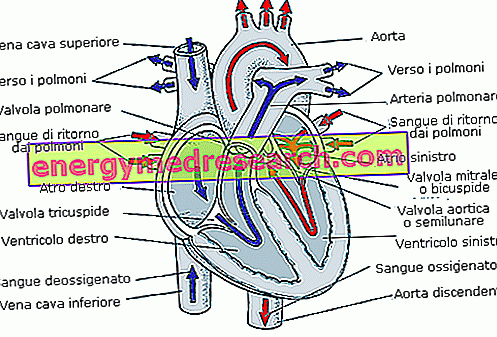Generality
Chronic renal failure is a serious medical condition characterized by a gradual decline in kidney function.
The causes of chronic renal failure are numerous. These include circumstances such as, for example, type 1 or type 2 diabetes, glomerulonephritis or polycystic kidney disease.

The effects of chronic renal failure are irreversible. However, proper treatment can slow the relentless advancement of the condition.
Short revision of the kidneys
Two in number, the kidneys are the main organs of the urinary or excretory apparatus.
The excretory apparatus is the set of anatomical organs and structures responsible for the production and elimination of urine .
Returning to the kidneys, these reside in the abdominal cavity, on the sides of the last thoracic vertebrae and the first lumbar vertebrae; they are symmetrical and have a shape that is very reminiscent of a bean.
The most important functions of the kidneys are:
- Filter waste substances, harmful substances and foreign substances present in the blood and convert them into urine.
- Adjust the hydro-saline balance of blood.
- Adjust the acid-base balance of blood
- Produce erythropoietin glycoprotein.
The anatomy of the kidneys is quite complex: the image below shows the main anatomical elements of a generic human kidney.

What is chronic renal failure?
Chronic renal failure is a serious medical condition affecting the kidneys and consists of a gradual decline in renal function.
In other words, the term chronic renal failure refers to a circumstance in which the kidneys have gradually lost their functional capabilities and due to a slow evolution mechanism.
Unfortunately, chronic renal failure has irreversible effects . In fact, the treatments available today for those affected are only able to slow down the inexorable progression of the functional decline of the kidneys.
KIDNEY FAILURE: MEDICAL DEFINITION
With kidney failure, doctors want to indicate an inability on the part of the kidneys to properly perform their functions.
ANOTHER TYPE OF RENAL FAILURE: THE ACUTE FORM
Kidney failure can also occur quickly and abruptly.
When the loss of renal function occurs with the aforementioned modalities, the doctors speak of acute renal failure .
Unlike chronic renal failure, acute renal failure is a condition that, if adequately treated, is potentially reversible . Its presence therefore does not exclude a restoration of renal function.
WHAT HAPPENS WHEN KIDNEYS WORK EVIL?
When the kidneys malfunction, various mechanisms are skipped:
- The mechanism of disposal of waste substances present at the blood level. This involves the progressive accumulation of these substances and the consequent intoxication of the blood.
Two important parameters that describe the amount of waste substances accumulating in the blood are azotemia and creatininemia .
Azotemia is the concentration of non-protein nitrogen (or urea) in the blood; non-protein nitrogen is a waste product of protein metabolism.
Creatininemia, on the other hand, is the concentration of creatinine in the blood; creatinine is a waste product deriving from the metabolism of creatine in the muscles.
A high azotemia and, in the same way, an elevated creatininemia are indexes of a malfunction of the kidneys.
- The mechanism of regulation of the hydro-saline balance of blood. This involves the accumulation of fluids (edema) in various parts of the body, for example in the legs or ankles.
- The mechanism of regulation of the acid-base balance of blood. From this derives an alteration of the blood levels of electrolytes, such as phosphorus and potassium.
- The production mechanism of erythropoietin.
Causes
Conditions or diseases such as: are among the main causes of chronic renal failure
- Type 1 diabetes and type 2 diabetes ;
- Hypertension ;
- Glomerulonephritis ;
- Interstitial nephritis ;
- The polycystic kidney ;
- Prolonged obstruction in the urinary tract. The causes of obstruction include: benign prostatic hypertrophy, kidney stones and some neoplasms;
- Vesicoureteral reflux ;
- Kidney infections ( pyelonephritis ).
RISK FACTORS OF CHRONIC KIDNEY FAILURE
The subjects most at risk of chronic renal failure are: diabetics, people with hypertension, heart patients, smokers, individuals with high blood cholesterol levels, the obese, the elderly, people with a family history of kidney diseases, African-American individuals, Native Americans and Asio Americans.
Symptoms and Complications
Symptoms and signs of chronic renal failure appear gradually.
The classic clinical manifestations of this medical condition are:
| Event | Consequence of: |
| High azotemia (hyperazotemia) |
| Phosphorus accumulation in the blood (hyperphosphataemia) |
| Potassium accumulation in the blood (hyperkalemia) |
| Accumulation of fluids in body tissues |
| Lack of erythropoietin production and anemia arising |
| Failure to carry out other renal mechanisms |
WHEN TO REFER TO THE DOCTOR?
The presence of the symptomatology indicated above must induce an individual to immediately contact his own doctor and consult with him about what to do.
Chronic kidney failure is a medical condition that requires adequate and timely treatment. Otherwise, the patient's life is in serious danger.
COMPLICATIONS
Chronic renal failure is itself a complication of other conditions or diseases.
Having said this, its further deterioration may coincide with: an aggravation of the edemas present; an even greater risk of bone fractures; the appearance of impotence or reduced libido; damage to the central nervous system, with all the consequences of the case; a reduction in immune defenses (hence a greater susceptibility to infections); an aggravation of cardiac arrhythmias; for a woman, the impossibility of facing a pregnancy; an even greater tendency to bleeding; the need to undergo dialysis or a kidney transplant surgery; finally, death, especially in the absence of adequate or timely treatment.
Diagnosis
For a correct diagnosis of chronic renal failure and its triggering causes, the following are essential: physical examination, medical history, blood tests, urinalysis and some diagnostic imaging tests.
In some situations, the use of a renal biopsy may also be indispensable, as it is useful in clarifying the causes.
BLOOD ANALYSIS
Blood tests allow you to measure azotemia and creatininemia and understand, from these parameters, how the kidneys work.
URINE ANALYSIS
Urinalysis provides information on the causes and characteristics of kidney failure in an individual.
RENAL BIOPSY
Renal biopsy is a minimally invasive diagnostic test, which consists of collecting a sample of kidney cells and then analyzing them in the laboratory.
It is useful for clarifying the causes of chronic renal failure.
Treatment
The treatment of chronic renal failure involves a therapy aimed at treating the causes ( causal therapy ), a therapy focused on improving the symptoms and complications ( symptomatic therapy ), dialysis, kidney transplantation (as soon as an organ is available compatible) and the adoption of a lifestyle adapted to the circumstances in place.
In short, the purpose of the treatment of chronic renal failure is to eliminate the triggering cause (s) and slow down, as far as possible, the inexorable progression of the disease .
CHRONIC RENAL FAILURE: SYMPTOMATIC THERAPY
Generally, the symptomatic therapy adopted in case of chronic renal failure includes:
- The administration of drugs against hypertension ( ACE inhibitors, angiotensin II receptor antagonists and diuretics )
- Medication to lower cholesterol levels ( statins ).
- The administration of drugs and other substances against anemia ( erythropoietin and iron supplements ).
- The administration of medicines against water retention (diuretics).
- Drug administration to protect bones from fractures ( calcium and vitamin D supplements and drugs to reduce excess phosphorus in the blood).
- The administration of drugs that prevent the accumulation of potassium in the blood ( sodium polystyrene sulfonate and the like).
DIALYSIS
Briefly, dialysis is a treatment that artificially reproduces certain functions of the kidney, cleaning up the blood from excess waste products and water.

Figure: dialysis
KIDNEY TRANSPLANTATION
Kidney transplantation is a surgical procedure to replace one or both kidneys with a healthy kidney from a compatible donor.
In general, the "new" kidney belongs to a recently deceased donor; however, there is also the possibility of taking a kidney from a living and consenting subject.
If the kidney transplant is successful, there is a complete restoration of renal function.
LIFESTYLE AND HOMEMADE REMEDIES
Generally, every patient with acute renal failure receives precise instructions from their treating physician on what type of diet to adopt.
Keeping to the letter of the doctor's planned diet is a fundamental cornerstone of the therapeutic process.
The most common dietary recommendations include:
- Avoid too salty foods.
- Prefer foods low in potassium.
- Limit the ingestion of protein-rich foods.
- Limit foods that are high in phosphorus.
Prognosis
Except when a healthy transplantable kidney is available, the prognosis in case of chronic renal failure is always poor.
Prevention
Avoid or limit the consumption of alcohol, do not exceed the use of certain drugs (aspirin, ibuprofen, etc.), control body weight, follow a healthy and low-salt diet, do not smoke, exercise regularly, treat immediately even the least worrying of kidney problems are the main preventive measures against kidney failure.



